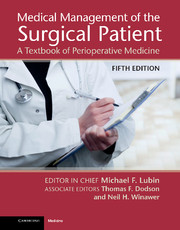Book contents
- Frontmatter
- Dedication
- Contents
- List of Contributors
- Preface
- Introduction
- Part 1 Perioperative Care of the Surgical Patient
- Section 1 General
- Chapter 1 Anesthesia management of the surgical patient
- Chapter 2 Specialized nutrition support in the surgical patient
- Chapter 3 Preoperative testing
- Chapter 4 Medication safety for surgical patients
- Chapter 5 Informed consent and decision-making capacity
- Chapter 6 Ethical considerations in the surgical patient
- Chapter 7 Perioperative pain management
- Chapter 8 The medical consult
- Section 2 Cardiology
- Section 3 Hypertension
- Section 4 Pulmonary
- Section 5 Gastroenterology
- Section 6 Hematology
- Section 7 Infectious disease
- Section 8 Renal disease
- Section 9 Endocrinology
- Section 10 Rheumatology
- Section 11 Neurology
- Section 12 Surgery in the Elderly
- Section 13 Obesity
- Section 14 Transplantation
- Section 15 Psychiatric Disorders
- Section 16 Peripartum Patients
- Part 2 Surgical Procedures and their Complications
- Index
- References
Chapter 8 - The medical consult
from Section 1 - General
Published online by Cambridge University Press: 05 September 2013
- Frontmatter
- Dedication
- Contents
- List of Contributors
- Preface
- Introduction
- Part 1 Perioperative Care of the Surgical Patient
- Section 1 General
- Chapter 1 Anesthesia management of the surgical patient
- Chapter 2 Specialized nutrition support in the surgical patient
- Chapter 3 Preoperative testing
- Chapter 4 Medication safety for surgical patients
- Chapter 5 Informed consent and decision-making capacity
- Chapter 6 Ethical considerations in the surgical patient
- Chapter 7 Perioperative pain management
- Chapter 8 The medical consult
- Section 2 Cardiology
- Section 3 Hypertension
- Section 4 Pulmonary
- Section 5 Gastroenterology
- Section 6 Hematology
- Section 7 Infectious disease
- Section 8 Renal disease
- Section 9 Endocrinology
- Section 10 Rheumatology
- Section 11 Neurology
- Section 12 Surgery in the Elderly
- Section 13 Obesity
- Section 14 Transplantation
- Section 15 Psychiatric Disorders
- Section 16 Peripartum Patients
- Part 2 Surgical Procedures and their Complications
- Index
- References
Summary
As mentioned in the Introduction, consultation has been a topic of discussion at least since the time of Hippocrates; the introduction also discusses a number of the moral, ethical, and interpersonal minefields in the process.
In this chapter, however, my purpose is to discuss the functional process of consultation so that other problems and obstacles can be avoided. The chapter is primarily addressed to clinicians doing consultations for surgical patients, both preoperative evaluations and postoperative management.
Perhaps the most useful and concise recommendations for consultation were developed by Goldman and Rudd in 1983 in a paper entitled “Ten commandments for effective consultation” in the Archives of Internal Medicine [1]. These recommendations were: (1) determine the question; (2) establish urgency; (3) look for yourself; (4) be as brief as appropriate; (5) be specific; (6) provide contingency plans; (7) honor thy turf; (8) teach with tact; (9) talk is cheap and effective; (10) follow up. I will address all of these commandments as we proceed.
For the consulting physician: A number of papers have identified one of the common and problematic difficulties in preoperative consultation. Consulting physicians frequently don’t identify what problem or problems the consultant is supposed to address. It is crucial for the care of the patient (and for more pragmatic billing purposes) for any problems to be identified. The most common consulting error is the referral for “surgical clearance.” Clearance for surgery implies that the consultant can identify which patients will or will not survive surgery, a task that requires more celestial talent than most consultants possess. “Preoperative evaluation” and “risk stratification” imply that there are reasons to think that the patient is at increased risk; if no problem can be identified, then there is no medical (or reimbursable) reason for consultation. Identifiable reasons (e.g., hypertension, diabetes, congestive heart failure) should be the consulting problem or problems.
- Type
- Chapter
- Information
- Medical Management of the Surgical PatientA Textbook of Perioperative Medicine, pp. 70 - 74Publisher: Cambridge University PressPrint publication year: 2013

